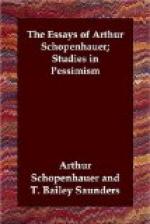On the other hand, the memory should be specially taxed in youth, since it is then that it is strongest and most tenacious. But in choosing the things that should be committed to memory the utmost care and forethought must be exercised; as lessons well learnt in youth are never forgotten. This precious soil must therefore be cultivated so as to bear as much fruit as possible. If you think how deeply rooted in your memory are those persons whom you knew in the first twelve years of your life, how indelible the impression made upon you by the events of those years, how clear your recollection of most of the things that happened to you then, most of what was told or taught you, it will seem a natural thing to take the susceptibility and tenacity of the mind at that period as the ground-work of education. This may be done by a strict observance of method, and a systematic regulation of the impressions which the mind is to receive.
But the years of youth allotted to a man are short, and memory is, in general, bound within narrow limits; still more so, the memory of any one individual. Since this is the case, it is all-important to fill the memory with what is essential and material in any branch of knowledge, to the exclusion of everything else. The decision as to what is essential and material should rest with the masterminds in every department of thought; their choice should be made after the most mature deliberation, and the outcome of it fixed and determined. Such a choice would have to proceed by sifting the things which it is necessary and important for a man to know in general, and then, necessary and important for him to know in any particular business or calling. Knowledge of the first kind would have to be classified, after an encyclopaedic fashion, in graduated courses, adapted to the degree of general culture which a man may be expected to have in the circumstances in which he is placed; beginning with a course limited to the necessary requirements of primary education, and extending upwards to the subjects treated of in all the branches of philosophical thought. The regulation of the second kind of knowledge would be left to those who had shown genuine mastery in the several departments into which it is divided; and the whole system would provide an elaborate rule or canon for intellectual education, which would, of course, have to be revised every ten years. Some such arrangement as this would employ the youthful power of the memory to best advantage, and supply excellent working material to the faculty of judgment, when it made its appearance later on.




